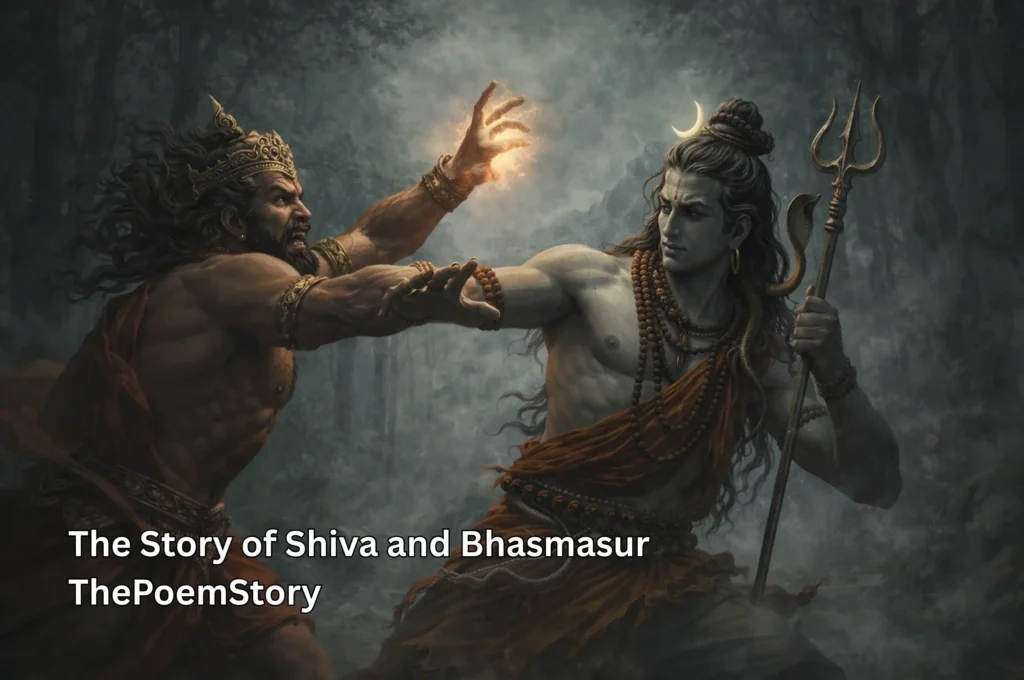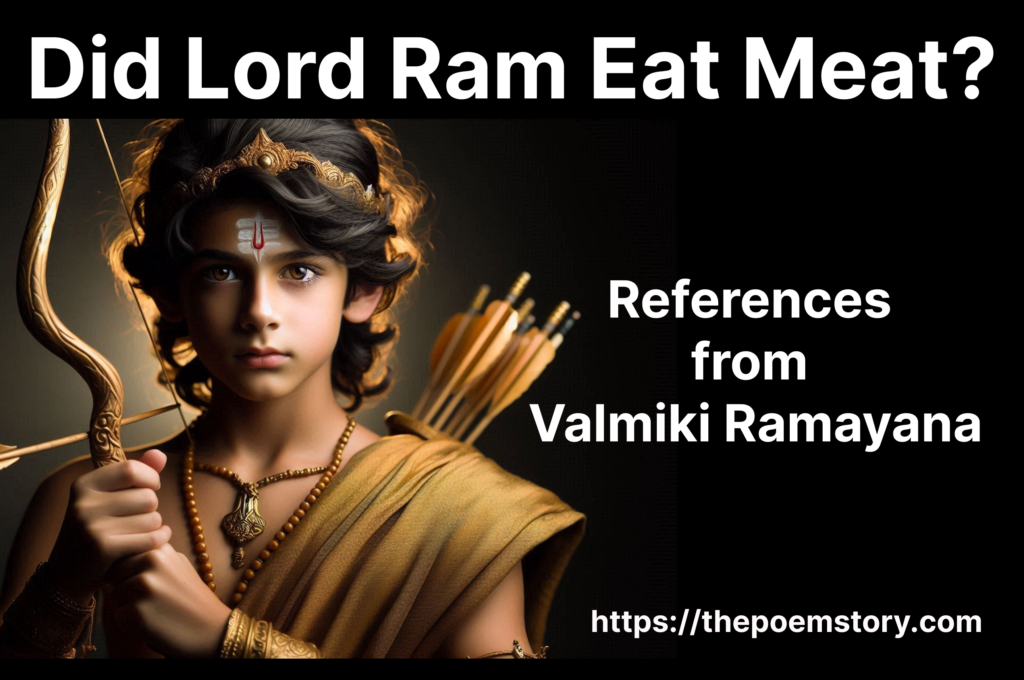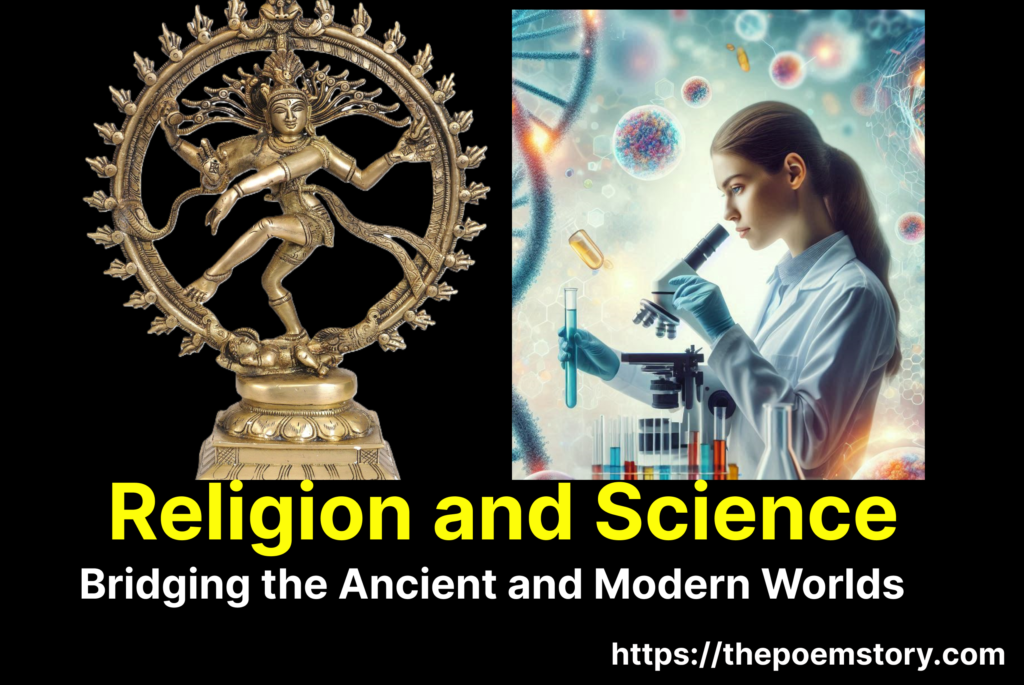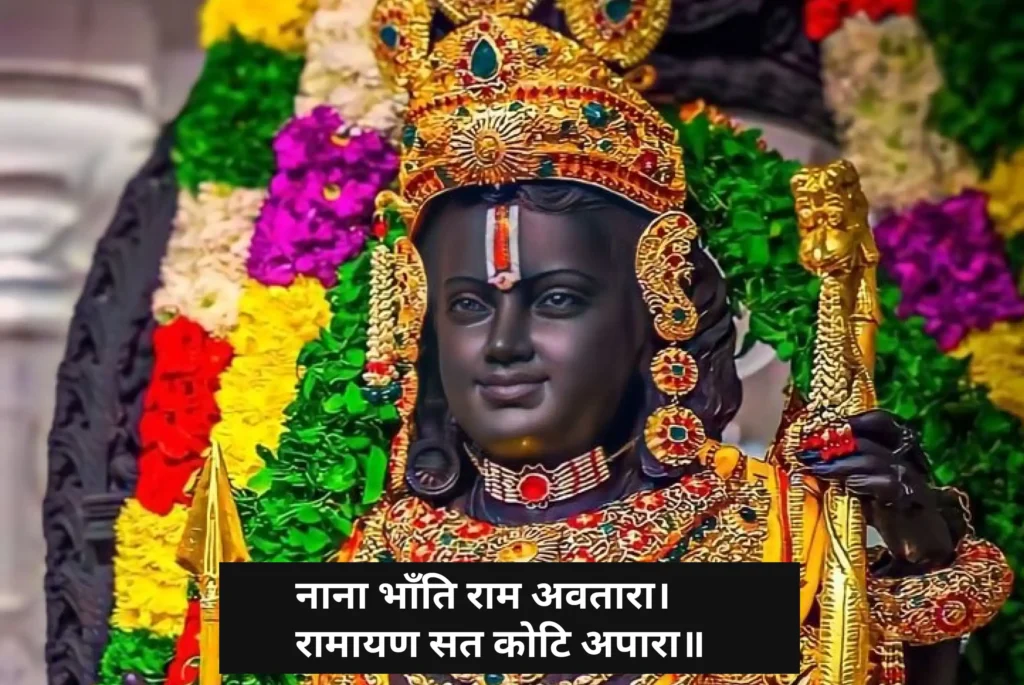This is the Story of Hayagreeva Avatar. The Hayagreeva Incarnation of Vishnu. In this story we will explores the significance of the Hayagreeva avatar in Hindu mythology. It highlights the importance of knowledge and wisdom, the preservation of sacred texts, the pursuit of spiritual enlightenment, and the triumph of good over evil. The Hayagreeva avatar is also associated with the protection of Dharma and the connection with Saraswati, the goddess of knowledge. Overall, the Hayagreeva avatar serves as a reminder of the multifaceted nature of divinity and the need for balance, knowledge, and spiritual growth.
Explore: Moral Stories, Mythological Stories
Table of Contents
The Story of Hayagreeva Avatar: The Incarnation of Vishnu
The story of Hayagreeva begins with the Devas (celestial beings) being tormented by the Asuras (demons) led by the powerful demon named Hayagreeva. The Asuras had gained immense power through their rigorous penance and were causing havoc in the universe. The Devas, unable to withstand the atrocities of the Asuras, sought the help of Lord Vishnu.
Upon hearing the plea of the Devas, Lord Vishnu decided to intervene and restore peace and harmony in the world. However, he realized that defeating the mighty Hayagreeva would require a different approach. Hayagreeva had obtained a boon from Brahma, the creator of the universe, which made him invincible against any weapon.
Lord Vishnu then embarked on a deep meditation, seeking guidance from the divine forces. Pleased with his devotion, Goddess Saraswati, the goddess of knowledge and wisdom, appeared before him. She revealed that the only way to defeat Hayagreeva was to acquire the knowledge of the sacred Vedas, which the demon had hidden away.
With the blessings of Saraswati, Lord Vishnu took the form of Hayagreeva, a deity with the head of a horse and the body of a human. This unique form symbolized the union of knowledge and strength. As Hayagreeva, Lord Vishnu possessed the divine knowledge of the Vedas, making him the ultimate repository of wisdom.
Hayagreeva then engaged in a fierce battle with Hayagreeva, using his newfound knowledge to outsmart the demon. With each encounter, Hayagreeva would reveal a different aspect of the Vedas, leaving the demon bewildered and defeated. Eventually, Lord Vishnu emerged victorious, vanquishing Hayagreeva and restoring peace in the universe.
The story of Hayagreeva teaches us the importance of knowledge and wisdom in overcoming challenges. It emphasizes that true power lies not only in physical strength but also in the pursuit of knowledge. The Hayagreeva avatar of Lord Vishnu serves as a reminder that one should strive for intellectual growth and enlightenment to overcome the obstacles of life.
Significance of the Hayagreeva Avatar in Hindu Mythology
Hayagreeva Incarnation of Vishnu
The Hayagreeva avatar is one of the lesser-known incarnations of Lord Vishnu, but its significance should not be underestimated. This unique form, with the head of a horse and the body of a human, holds several symbolic meanings and serves a specific purpose in Hindu mythology. As we delve deeper into the significance of the Hayagreeva avatar, we uncover its profound spiritual and cosmic implications.
First and foremost, the horse head of the Hayagreeva avatar represents power, strength, and swiftness. Horses have long been associated with these qualities in various cultures around the world. In Hindu mythology, horses are considered sacred animals and are often associated with gods and goddesses. The horse head of Hayagreeva symbolizes the divine energy and vitality that can overcome any obstacle or challenge.
Moreover, the human body of the Hayagreeva avatar signifies intelligence, wisdom, and the ability to reason. It represents the human potential to attain spiritual enlightenment and transcend the limitations of the physical world. By combining the horse and human forms, the Hayagreeva avatar embodies the harmonious integration of power and wisdom, reminding us of the importance of balancing our physical and spiritual selves.
Another significant aspect of the Hayagreeva avatar is its association with knowledge and learning. In Hindu mythology, Hayagreeva is revered as the bestower of knowledge and wisdom. He is often depicted as holding the Vedas, the sacred scriptures of Hinduism, in his multiple hands. This aspect of the Hayagreeva avatar emphasizes the importance of education and the pursuit of knowledge in one’s spiritual journey.
Furthermore, the Hayagreeva avatar has a profound cosmic significance. It is believed that Hayagreeva played a crucial role in retrieving the Vedas, which had been stolen by demons. By restoring the Vedas to the gods, Hayagreeva ensured the preservation of divine knowledge and the balance between good and evil. This cosmic battle between light and darkness symbolizes the eternal struggle for knowledge and enlightenment.
Overall, the Hayagreeva avatar serves as a powerful reminder of the multifaceted nature of divinity and the importance of balance, knowledge, and spiritual growth. It teaches us that true power lies not only in physical strength but also in wisdom and understanding. By invoking the blessings of the Hayagreeva avatar, devotees seek to cultivate these qualities within themselves and strive for spiritual enlightenment.
Hayagreeva as Preserver of Knowledge and Wisdom
One of the main reasons why Vishnu took the form of Hayagreeva was to preserve and protect knowledge and wisdom. In Hinduism, knowledge is considered sacred and divine. The Hayagreeva avatar represents the embodiment of supreme wisdom and intelligence. As the horse is known for its swiftness and agility, Lord Hayagreeva symbolizes the speed and efficiency with which knowledge is acquired and shared.
According to the legend, during the primordial times, a demon named Hayagreeva stole the sacred Vedas, which contained the essence of all knowledge. This act threatened the balance of the universe and the well-being of humanity. To retrieve the stolen Vedas and restore order, Lord Vishnu took the form of Hayagreeva.
In this avatar, Lord Hayagreeva battled the demon Hayagreeva and successfully recovered the Vedas. By doing so, he ensured that knowledge and wisdom were preserved and made accessible to humanity. The Hayagreeva avatar thus represents the eternal quest for knowledge and the importance of preserving it for the benefit of all.
Lord Hayagreeva’s role as the preserver of knowledge and wisdom extends beyond the retrieval of the stolen Vedas. He is also believed to be the bestower of intelligence and the remover of ignorance. Devotees of Lord Hayagreeva seek his blessings to enhance their learning abilities, improve their memory, and gain a deeper understanding of the world around them.
Furthermore, Lord Hayagreeva is considered the patron deity of scholars, students, and teachers. In many educational institutions, his idol or image is placed in classrooms or libraries as a symbol of inspiration and guidance. Students often offer prayers to Lord Hayagreeva before important exams or when seeking clarity in their studies.
The significance of Lord Hayagreeva in the pursuit of knowledge is not limited to the realm of academia. It extends to all aspects of life, as knowledge is essential for personal growth, spiritual development, and making informed decisions. Lord Hayagreeva’s presence in one’s life is believed to bring clarity, wisdom, and a deep sense of purpose.
Moreover, the Hayagreeva avatar serves as a reminder that knowledge should be shared selflessly and used for the betterment of society. In a world where information is easily accessible, Lord Hayagreeva’s teachings emphasize the importance of using knowledge responsibly and ethically.
In conclusion, the Hayagreeva avatar of Lord Vishnu represents the preservation and protection of knowledge and wisdom. Through his divine form, Lord Hayagreeva ensures that knowledge is not only acquired but also safeguarded for the benefit of humanity. His presence inspires seekers of knowledge to strive for excellence, seek clarity, and use wisdom for the betterment of themselves and the world around them.
Hayagreeva as Protector of Dharma
Another significant aspect of the Hayagreeva avatar is its role as a protector of Dharma, the cosmic order and righteousness. In Hindu mythology, Dharma is considered the foundation of a harmonious and just society. When Dharma is disrupted, chaos and imbalance prevail.
The demon Hayagreeva, by stealing the Vedas, not only threatened knowledge but also disrupted the cosmic balance. Lord Vishnu, in his Hayagreeva form, intervened to restore Dharma and bring back order to the universe. By defeating the demon and reclaiming the Vedas, Lord Hayagreeva ensured that righteousness prevailed over evil.
Thus, the Hayagreeva avatar serves as a reminder of the importance of upholding Dharma and the need to combat forces that seek to disrupt it. It symbolizes the eternal battle between good and evil and the ultimate triumph of righteousness.
Furthermore, the Hayagreeva avatar is often associated with the preservation and protection of knowledge. The Vedas, which were stolen by the demon, are the sacred texts of Hinduism and contain profound wisdom and spiritual insights. By safeguarding the Vedas and restoring them to their rightful place, Lord Hayagreeva ensures that the knowledge contained within them is preserved for future generations.
In this sense, the Hayagreeva avatar can be seen as a guardian of wisdom and a defender of intellectual pursuits. It emphasizes the importance of education and the pursuit of knowledge in the quest for spiritual enlightenment. Just as Lord Hayagreeva defeated the demon to reclaim the Vedas, individuals must overcome obstacles and challenges in their own lives to acquire knowledge and gain a deeper understanding of the world.
Moreover, the Hayagreeva avatar also highlights the significance of discipline and self-control in the pursuit of righteousness. In Hindu mythology, Lord Hayagreeva is often depicted with a horse’s head, symbolizing his swiftness and agility. This imagery represents the need for individuals to cultivate discipline and control over their actions and desires in order to uphold Dharma.
By embodying these virtues, the Hayagreeva avatar serves as a role model for individuals striving to lead a righteous and purposeful life. It teaches the importance of integrity, honesty, and moral conduct in all aspects of existence.
Firstly, the Hayagreeva avatar represents knowledge and wisdom. In Hinduism, knowledge is considered one of the most important virtues, and Lord Vishnu’s manifestation as Hayagreeva highlights the significance of knowledge in the world. Hayagreeva is often depicted with a horse’s head, symbolizing intelligence, speed, and power. This form of Lord Vishnu signifies the importance of acquiring knowledge and using it for the betterment of oneself and society.
Secondly, the Hayagreeva avatar is associated with the preservation of sacred texts. In Hinduism, scriptures like the Vedas and the Upanishads are considered divine revelations and are believed to contain the ultimate knowledge. Lord Vishnu, in his Hayagreeva form, is believed to have restored these sacred texts after they were stolen by demons. This emphasizes the importance of preserving and protecting knowledge for future generations.
Furthermore, the Hayagreeva avatar is closely linked to the concept of liberation and spiritual enlightenment. In Hindu philosophy, the ultimate goal of human life is to attain moksha, or liberation from the cycle of birth and death. Lord Vishnu’s manifestation as Hayagreeva signifies his role in guiding individuals towards spiritual enlightenment and helping them overcome ignorance and attachment.
Additionally, the Hayagreeva avatar is associated with the destruction of evil forces. In Hindu mythology, demons are often depicted as symbols of ignorance, greed, and ego. Lord Vishnu, in his Hayagreeva form, is believed to have defeated these demons, symbolizing the triumph of knowledge and righteousness over ignorance and evil.
Overall, the choice of the Hayagreeva avatar by Lord Vishnu holds deep symbolism and significance. It represents the importance of knowledge, the preservation of sacred texts, the path to spiritual enlightenment, and the triumph of good over evil. Through this unique form, Lord Vishnu teaches us the value of acquiring knowledge, preserving wisdom, and striving for spiritual growth.
Wisdom and Devotion
The horse is often associated with qualities such as intelligence, strength, and loyalty. Lord Hayagreeva, with his horse-like head, represents the fusion of wisdom and devotion. Wisdom, symbolized by the human form, is essential for making informed decisions and understanding the deeper truths of life. Devotion, symbolized by the horse’s qualities, represents unwavering dedication and loyalty towards a higher power.
The Hayagreeva avatar thus signifies the harmonious combination of wisdom and devotion, emphasizing the importance of both aspects in one’s spiritual journey.
Wisdom is the ability to discern between right and wrong, to understand the complexities of life, and to make enlightened choices. It is the light that guides us through the darkness, illuminating our path towards self-realization. Without wisdom, we may stumble in ignorance, unable to grasp the true nature of existence.
On the other hand, devotion is the fuel that ignites our spiritual journey. It is the unwavering faith and love we have towards a higher power, whether it be a deity, a guru, or an ideal. Devotion is the force that propels us forward, giving us the strength to overcome obstacles and persevere in our quest for enlightenment.
Lord Hayagreeva embodies the perfect balance between these two qualities. With his horse-like head, he represents the power and strength of devotion, while his human form signifies the wisdom and intelligence that are necessary for spiritual growth. By merging these two aspects, Lord Hayagreeva teaches us that true enlightenment can only be achieved when wisdom and devotion are cultivated in equal measure.
Wisdom without devotion can lead to arrogance and intellectual pride. It can make us detached from the world, disconnected from the emotions and experiences that make us human. On the other hand, devotion without wisdom can result in blind faith and dogmatism. It can make us vulnerable to manipulation and prevent us from questioning the teachings we receive.
Lord Hayagreeva’s presence reminds us that the spiritual path is not a one-sided journey. It requires both the development of wisdom and the cultivation of devotion. We must seek knowledge and understanding, constantly questioning and exploring the mysteries of existence. At the same time, we must surrender ourselves to a higher power, trusting in its guidance and surrendering our ego to its will.
By embracing both wisdom and devotion, we can navigate the complexities of life with clarity and purpose. We can make informed decisions that align with our spiritual values and live a life of integrity and authenticity. Lord Hayagreeva serves as a reminder that the true path to enlightenment lies in the harmonious integration of these two essential qualities.
Connection of Hayagreeva with Saraswati, the Goddess of Knowledge
Another significant aspect of the Hayagreeva avatar is its connection with Saraswati, the goddess of knowledge, music, and the arts. Saraswati is often depicted with a veena, a musical instrument associated with divine harmony and creativity.
In the Hayagreeva avatar, Lord Vishnu not only retrieves the stolen Vedas but also ensures the restoration of Saraswati’s presence. The recovery of the Vedas signifies the revival of knowledge and the arts, which are essential for the progress and well-being of society.
By assuming the form of Hayagreeva, Lord Vishnu establishes a deep connection with Saraswati, emphasizing the interdependence of knowledge, creativity, and spirituality.
Saraswati, known as the embodiment of wisdom, is revered as the source of all knowledge and the patroness of learning. She is depicted as a serene and graceful deity, adorned in white garments, symbolizing purity and enlightenment. Her association with the veena represents her mastery of music and the arts, highlighting the importance of aesthetics in the pursuit of knowledge.
In Hindu mythology, Saraswati is believed to be the wife of Lord Brahma, the creator of the universe. Together, they form the divine trinity along with Lord Vishnu and Lord Shiva. Saraswati’s presence in the Hayagreeva avatar signifies the divine collaboration between Lord Vishnu and the goddess of knowledge.
As the protector and preserver of knowledge, Lord Vishnu’s manifestation as Hayagreeva not only ensures the recovery of the stolen Vedas but also safeguards the wisdom and intellectual pursuits of humanity. The restoration of Saraswati’s presence symbolizes the rejuvenation of intellectual and artistic endeavors, fostering a society that values and cherishes knowledge.
Furthermore, the connection between Hayagreeva and Saraswati highlights the inseparable bond between spirituality and learning. In Hindu philosophy, knowledge is not limited to worldly pursuits but encompasses the spiritual realm as well. The Hayagreeva avatar serves as a reminder that true wisdom transcends intellectual knowledge and encompasses a deeper understanding of the divine.
Through the Hayagreeva avatar, Lord Vishnu not only restores the stolen Vedas but also rekindles the flame of knowledge and creativity in society. This divine intervention signifies the importance of knowledge in the evolution of humanity and emphasizes the need for the harmonious integration of intellect, spirituality, and the arts.



















